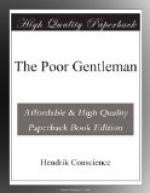“It is needless to describe the wild despair in which I found my brother, or to tell you how long I had to wrestle with his spirit in order to force a ray of hope into his soul. There was but one means by which we could save his honor and life; but—oh God!—at what a sacrifice! I was obliged to pledge all my property as security for his debts. Nothing could be spared; our ancestral manor-lands, your mother’s marriage-portion, your moderate dowry,—all were ventured with the certainty that the greater part would unquestionably be lost! On these hard conditions my brother’s honor might be saved; and, if that could be rescued, he was willing to renounce the determination to escape shame by death. I must in justice say that it was not he who demanded the sacrifice from me: on the contrary, he did not suppose that I could or would make it; but I was satisfied in my mind that if I did not settle his affairs, at all hazards, he would execute his criminal project against his life. And yet—and yet, my child—I hesitated!”
“Father!” exclaimed Lenora, “you did not refuse!”
A happy smile beamed on his face as he met the questioning glance of his daughter and answered, firmly,—
“I loved my brother, Lenora; but I loved you, my only child, much more. The sacrifice demanded of me by his creditors insured misery for your mother and for you!”
“Oh, God! oh, God!” sobbed Lenora.
“On one side my heart was distracted by this dreadful thought, while on the other I was assailed by the despair that was present in the bankrupt’s chamber; but generosity conquered in the awful trial, and at daylight I sought out the principal creditors and signed the documents that saved a brother’s life and honor but gave up my wife and child to want.”
“Thank God!” gasped Lenora, as if she had been relieved from a horrible nightmare. “Bless you, bless you, father, for your noble, generous conduct!”
She rose from her seat, and, passing her arms around his neck, gave him a glowing kiss with as much solemnity as if she had been anxious to endue this mark of love with all the fervor and sacredness of a benediction.
“Ah! but canst thou bless me, my child,” said he, with eyes foil of gratitude, “for an act that should implore thy pardon?”
“My pardon, father!” exclaimed Lenora, with surprise on all her features. “Oh, had you done otherwise, what would I not have suffered in doubting the goodness of my parent’s heart! Now, now, I love you more than ever! Pardon you, father? Is it a crime to save a brother’s life when it is in your keeping?”
“Alas, Lenora, the world does not reason thus, and never forgives us for the guilt of poverty. Reduced to that, we suffer humiliations which any one may observe in the lives of multitudes of our nobles. Yes; society regards poverty as a crime, and it treats us like outcasts. Our equals avoid us in order not to be confounded in our misery; while peasants and tradesmen laugh at our misfortune as if it was a sort of agreeable revenge. Happy, happy they to whom heaven has given an angel to pour comfort and consolation into their hearts in hours of want and dejection! But listen, my child!




